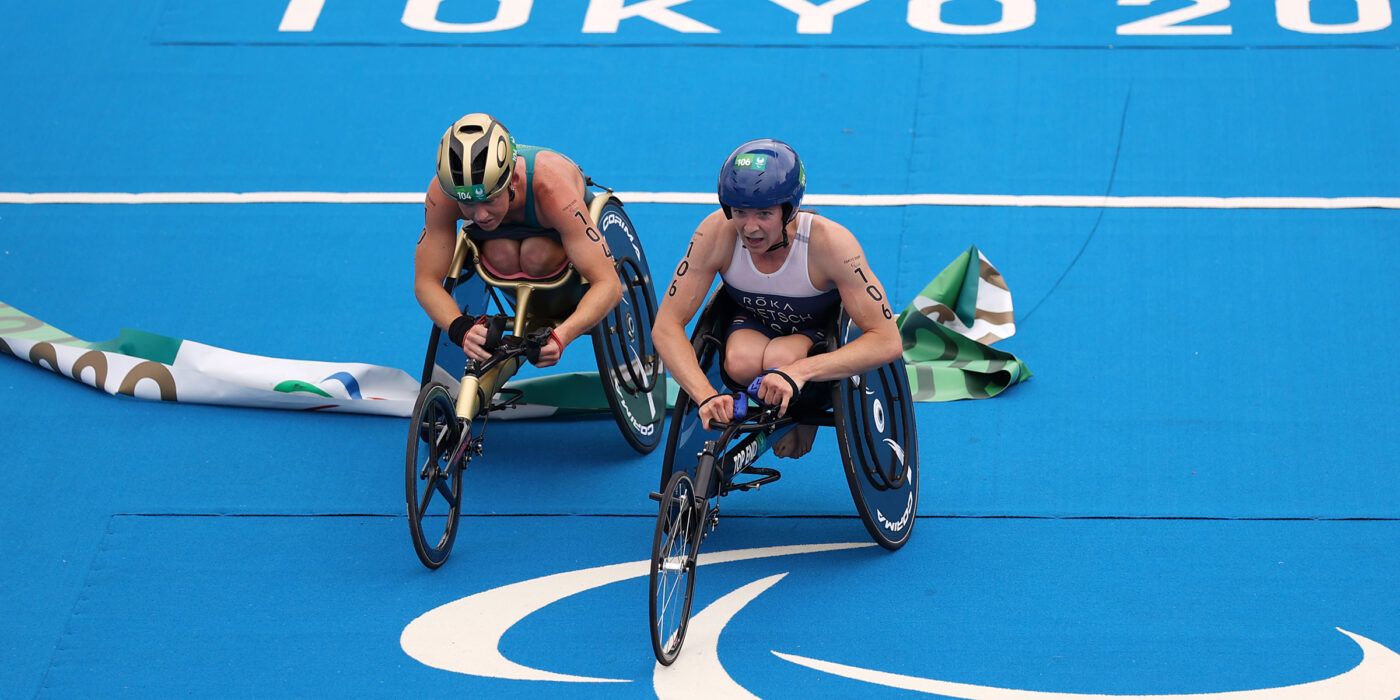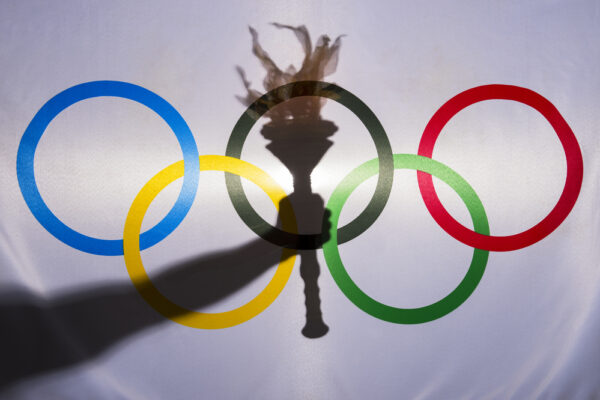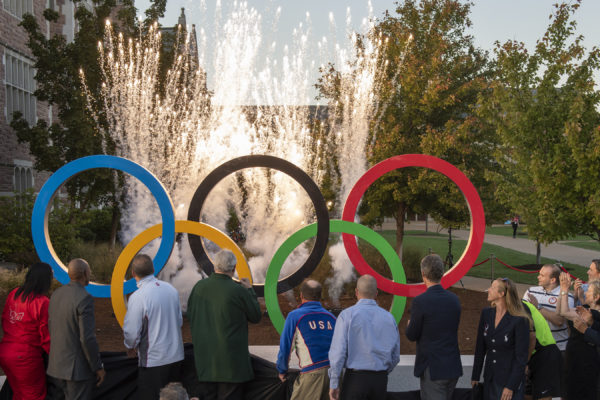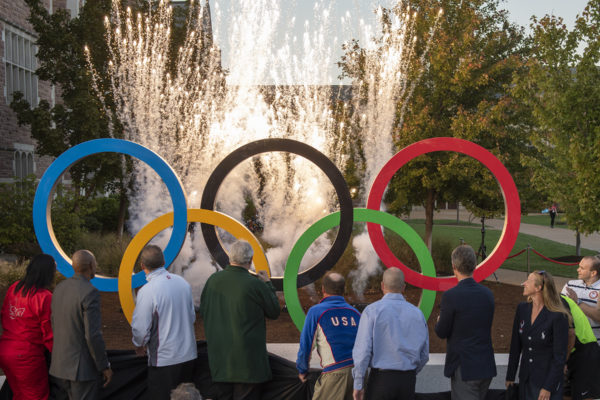It’s among the most dramatic of international sports moments you probably never saw, performed by a Washington University in St. Louis alumna who never wore a red and green uniform.
On Aug. 28, 2021, Kendall Gretsch, who earned her degree in biomedical engineering in 2014 from the McKelvey School of Engineering, was competing in the women’s paratriathlon at the 2021 Paralympic Games in Tokyo when she overcame Australia’s Lauren Parker in the last leg of the race at the finish line – at the last second.
Want to be inspired? Stop reading and watch how far Gretsch had to come to win the gold medal. (Hint: It gets really good at the 3:30 mark.) Go ahead. We’ll be here when you get back.
Because once you see how determined she was to get to the finish line, you’re going to want to learn more about this remarkable athlete.
Once you learn how the achievement put her in rare Paralympic air, you’re going to wonder what was going through her mind during the medal ceremony listening to the National Anthem.
And once you’ve learned all that, you’re probably going to want to mark your calendar for a few weeks from now, when Gretsch competes again in paralympic competition at the 2022 Winter Games in Beijing. Yes, the summer paralympian who competes in triathlon is also a winter paralympian who competes in cross country skiing and biathlon. And this time, she’ll have just six months between competitions.
But first that finish
Because of the intricate rules of the paralympic triathlon, Parker was given a four-minute, four-second head start due to the classification of her disability. But that didn’t deter Gretsch, who poured it on down the stretch and overcame Parker about a yard from the finish line. Gretsch would win with a time of 1:06.25 — one-tenth of a second faster than Parker, who finished at 1:06.25.
“I’d been racing triathlons for nine years by that point,” Gretsch said via Zoom last fall, from a training facility near Canada’s Banff National Park. A Nordic athlete needs snow, and in October that was where the snow was. But she was happy to talk about Tokyo. “I knew what I needed to do, and I knew it was going to take me having my best day,” she recalls. “With each lap, I could see the time cutting away.”
Because no spectators were allowed at the Tokyo games due to COVID precautions, the stands were filled with other triathletes whom Gretsch knew from international competition, including her USA teammates cheering her on. “They were so loud every time I went past the stands,” she says. “I remember thinking, ‘Everyone that has helped me get here is here, and they’re cheering me.’ But I also knew it was going to be a close race. So I was kind of like, whatever happens, I’m just excited to be here and excited to be part of this moment.”
The effort it took to pass Parker down the stretch earned Gretsch her first Summer Paralympic Games medal, adding to the two golds she already had earned in Nordic skiing at the PyeongChang Paralympic Games in 2018, one in the 12K cross-country race and one in the 6K biathlon. Of particular note: The biathlon win made her the first U.S. woman to win the event in either Olympic or Paralympic competition. She is now one of the six Americans who have won gold at both the Summer and Winter Paralympics.
Also cheering that Tokyo race, halfway around the world, were seven of Gretsch’s WashU classmates, friends and roommates, scattered throughout the country but gathered together on a Zoom call to watch.
“One of our friends was doing the math every lap, and we knew it would go down to the wire.”
Margaret Lewis
“One of our friends was doing the math every lap, and we knew it would go down to the wire,” says Margaret Lewis, AB ’14, who first met Gretsch when they were both assigned the same floor. They were friends all four years, were roommates junior and senior year, and then lived together in Madison, Wisconsin, for a few years post-graduation, where they both got jobs. “We were going crazy on Zoom, each of us from our living rooms or offices,” Lewis recalls.
This being the pandemic era, someone recorded the Zoom session and sent it to Gretsch, who, when she got the chance, relished watching her roommates watch her win gold. “They’re all in their little squares watching,” she says. “It was so cool that they were able to experience it. They are such an important part of my WashU experience.”
Never avoiding a challenge
Gretsch’s career on the Danforth Campus was already an accomplished one. In spring 2014, she was part of the famed team that created a pink prosthetic arm for a St. Louis–area teenager, using a 3D printer and at a cost of just $200. She was also part of a team in 2013 that won a national competition for a device that helped control finger movements for stroke patients and others with limited mobility.
Her disability, she says, was never a deterrent. Gretsch was born with a form of spina bifida but is able to walk with crutches and leg braces. She has always been an athlete, keeping up with her sisters playing softball as a kid in Downers Grove, Illinois, near Chicago, and swimming in high school. And she never shied away from a challenge once she got here: not finding her classes as a first-year on the Danforth Campus, not a challenging academic load and certainly not a senior capstone project in engineering.
“She’s so driven and focused, and she works really, really hard at whatever she’s doing. Her passion and commitment were obvious from the time we met.”
Margaret Lewis
“She’s so driven and focused,” Lewis says, “and she works really, really hard at whatever she’s doing. Her passion and commitment were obvious from the time we met. She will always go above and beyond. Once we moved to Madison, she was still working a full-time job but training every hour she could.”
Gretsch knew of WashU’s reputation and says she matriculated here for the same reason most high school seniors do. “Academics,” she says. “I never thought about doing sports in college.” But after her sophomore year and at home for summer break, she got back into swimming and began training for and competing in triathlons through a Chicago-based adaptive sports group called Dare2tri.
“They were really supportive of me getting started in competitive triathlons,” Gretsch says of Dare2tri. “They took away any sort of excuse that I had of why I wouldn’t be able to do this or continue training. And once I got back on campus, they connected me with an adaptive sports group in St. Louis that loaned me equipment I could train on.
“At every step, they were the support system that I needed.”
After graduating from WashU, Gretsch got a job at a Madison-based health-care software company called Epic Systems and continued to compete in international paratriathlete competitions, earning three world titles from 2014–16. In 2015, she was nominated for one of ESPN’s “ESPY” awards for “Best Female Athlete With a Disability.”
She continues to work at Epic as a consultant and has a schedule that allows her to train full time – in the winter for the Nordic events and in the summer for the triathlon. “I love being in each season and competing,” she says. “At the end of the triathlon season, I’m ready for a change. So it’s nice to be able to jump into skiing, and vice versa.”
Did someone say racing?
“I have so many memories of WashU, but to me, it was the things that you did in between the big stuff, the things you did to keep your sanity for being up so late working,” Gretsch says. “Like racing down the halls on computer chairs – those funny little moments that stay with you.”
Racing down the halls? Perhaps she honed just a bit of that competitive edge on the east end of campus, but it’s the friends she made that she treasures. “It’s the people that I met at WashU that made the experience for me,” she says.
Friends who will assuredly be watching next month. The Beijing Paralympic Games are scheduled for March 4–13, and Gretsch will be defending her titles in the 6K biathlon and 12K cross-country races. (More information about the games can be found here.)
“She always loved the Olympics,” Lewis says. “It’s all so surreal now because I remember senior year during the Sochi Games, she set up camp in our living room and watched them nonstop, and I remember saying to her, ‘This is waaaay too much Olympics.’
“Not for Kendall. She’s always loved the atmosphere, and so all this is just perfect for her,” Lewis says. “But when she meets people, she never tells them about it. I’m always bragging on her behalf; I’m like, ‘Oh my gosh, Kendall is so cool.’”
The view from here
After Beijing, Gretsch will start training for the Paralympic Games in Paris in 2024, competing again in the triathlon where she hopes her family and friends will be able to watch – in person, this time. “I think it would be great to be able to share the summer games’ experience with my family especially, who weren’t able to be in Tokyo,” Gretsch says. “That is the one missing piece for me.”
What’s it like to grace a medal podium with a gold medal around your neck while the National Anthem plays? She smiles and, in characteristic Kendall Gretsch form, shares a moment most of us can only dream about by sharing the credit:
“Most athletes appreciate the fact there’s this massive team behind you. But during a medal ceremony, it’s all there in front of you. You can see them all.”
Kendall Gretsch
“You can’t really even believe that it happened,” she says. “A medal ceremony is cool because it gives you a moment to reflect on what just happened and really appreciate the accomplishment. And not just what you were able to do, but how, because it’s so much bigger than yourself.
“Most athletes appreciate the fact there’s this massive team behind you. But during a medal ceremony, it’s all there in front of you. You can see them all: the coaches, nutritionists, physical therapists, the strength coach, the sports psychologist, your teammates. It becomes a moment you get to share with all of them because no one can do it alone.”



